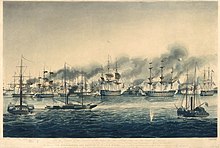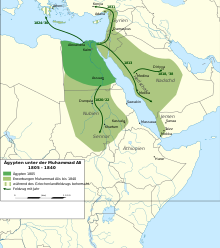Oriental Crisis of 1840
| Oriental Crisis of 1840 | |||||||
|---|---|---|---|---|---|---|---|
| Part of Egyptian–Ottoman War (1839–1841) | |||||||
 The bombardment and capture of St Jean d'Acre | |||||||
| |||||||
| Belligerents | |||||||
|
|
Egypt Eyalet | ||||||
| Commanders and leaders | |||||||
|
| |||||||
The Oriental Crisis of 1840 was an episode in the
Background
In the preceding decades, Muhammad Ali had expanded and strengthened his hold on Ottoman territory, beginning with Egypt, where he acted as a viceroy for the Sultan. Called upon to assist the Ottomans in the Greek War of Independence, Muhammad Ali in return demanded parts of Ottoman Syria to be transferred to his personal rule. When the war ended and the Porte failed to keep its promise, Muhammad Ali launched a military campaign against his Ottoman masters and easily took most of the Syrian lands.
Syrian War

In 1839, the Ottoman Empire attempted to retake Syria from Muhammad Ali but was defeated by his son, Ibrahim Pasha in the Battle of Nezib. Thus, a new war between Muhammad Ali and the Ottomans escalated, with the latter failing once again to wage it successfully. In June 1840, the entire Ottoman navy defected to Muhammad Ali, and the French planned to offer full support to his cause.[1]
On the verge of total collapse and defeat to Muhammad Ali, an alliance of European powers comprising
Convention of London
By the
French position
The French, under the newly-formed cabinet of
Military campaign

In September 1840, the European powers eventually moved from diplomatic means to military action. When French support for Muhammad Ali failed to materialize, British and Austrian naval forces in the eastern Mediterranean moved against Syria and Alexandria.[5]
Long-term results
After the surrender of Acre, Muhammad Ali finally accepted the terms of the Convention on 27 November 1840. He renounced his claims over
Ecologist
See also
- History of Ottoman Egypt
- History of the Ottoman Empire
- History of Egypt under the Muhammad Ali dynasty
References
- ^ Efraim Karsh, Inari Karsh, Empires of the Sand: The Struggle for Mastery in the Middle East, 1789-1923, (Harvard University Press, 2001), 36-37.
- ^ Geoffrey G. Butler, Simon Maccoby, The Development of International Law, p. 440
- ^ Efraim Karsh, Inari Karsh, Empires of the Sand: The Struggle for Mastery in the Middle East, 1789-1923, (Harvard University Press, 2001), 38.
- ^ Efraim Karsh, Inari Karsh, Empires of the Sand: The Struggle for Mastery in the Middle East, 1789-1923, (Harvard University Press, 2001), 37.
- ^ H. Wood Jarvis, Pharaoh to Farouk, (London: John Murray, 1956), 134.
- ^ Morroe Berger, Military Elite and Social Change: Egypt Since Napoleon, (Princeton, New Jersey: Center for International Studies, 1960), 11.
- ^ Malm, Andreas (8 April 2024). "The Destruction of Palestine Is the Destruction of the Earth". Verso Books. Retrieved 24 April 2024.
Further reading
- Charles R. Middleton. Cabinet Decision Making at the Accession of Queen Victoria: The Crisis of the East 1839-1840," Journal of Modern History (1979) 51#2 On Demand Supplement pp. D1085-D1117 in JSTOR
